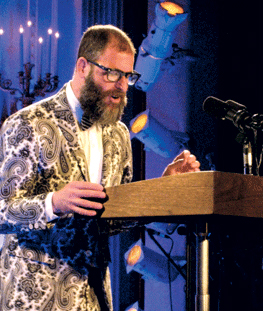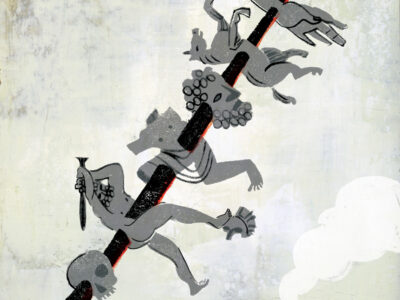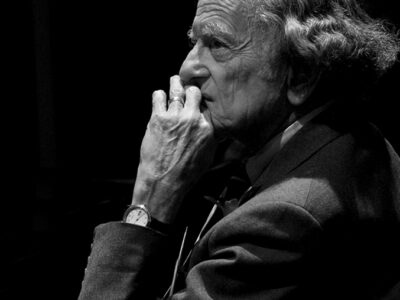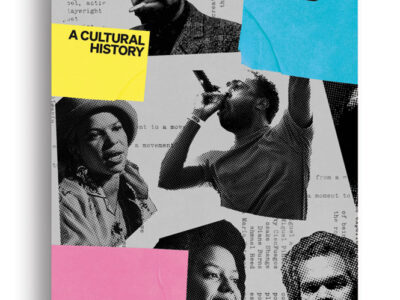
So there’s Kenneth Goldsmith, hanging out in the White House, about to meet the president of the United States.
He’s already been whisked through Washington in a siren-topped car driven by “some kind of military guy.” He’s already told the First Lady about the “uncreative writing” classes he teaches at Penn and the unconventional books he writes. And now he’s standing around in an outrageous white suit crammed with swirling black paisley designs, waiting for the president.
Suddenly, Barack Obama is coming toward him, shaking Goldsmith’s hand and telling him, “I like that suit.”
“Well thank you, Mr. President,” Goldsmith replies.
“I would wear that suit,” Obama continues, “but my staff would never let me.”
“Well, I guess in one way being an artist is better than being the president,” says Goldsmith. “We can wear whatever we want.”
Obama laughs. So does Goldsmith.
It sounds like the beginning of a bizarre dream, or perhaps a film parody—Mr. Goldsmith Goes to Washington—but the whole thing actually happened this past May when Goldsmith was invited to read at the White House’s “Evening of Poetry” event (outlandish suit optional) and to participate in a poetry workshop for high-school students led by First Lady Michelle Obama.
In case you had any doubts, Goldsmith’s approach to writing matches his wardrobe’s avant-gardism. He started out as a sculptor, earning a BFA from the Rhode Island School of Design in 1984 and creating book sculptures in the late 1980s. He quickly “fell more in love with the words than with the sculptural process,” and over the next decade he began giving himself “permission to drop the sculpture and focus on the words.” He became a gallery-text artist, then began producing his own written work just as a practice called “conceptual writing” emerged. He’s published 10 books since then, including Fidget—a chronicle of every movement his body made during a 13-hour period; and Day—a complete transcription of The New York Times’ September 1, 2000 issue.
Publisher’s Weekly described his work as “some of the most exhaustive and beautiful collage work yet produced in poetry”—but that doesn’t mean you’d actually want to read it. Goldsmith says that in his and other conceptual writing “the ideas are more compelling than the reading experience.” As he told the First Lady and her workshop students at the White House: “I am the most boring writer who has ever lived. I’m famous for that. My books bore me so badly, I can’t read them. I fall asleep when I have to proofread them. They’re horrible.”
Still, it was two excerpts from his book Traffic—a transcription of every traffic report given on a New York City AM radio station at 10-minute intervals over the course of 24 hours—that had the White House audience laughing and applauding that evening. Building on a Brooklyn Bridge theme, Goldsmith read from Walt Whitman’s “Crossing Brooklyn Ferry” and Hart Crane’s “To Brooklyn Bridge” before finishing with his Traffic excerpts.
“I was told this would not be a poetry-savvy audience, so I wasn’t entirely sure what to expect,” he says now. “They were quiet during the Whitman. They were quiet during the Crane. And they roared for the traffic reports. They loved the uncreative writing. That’s really what they responded to.”
When he’s not teaching Penn students to find similar creative success through uncreative practices—some of their work even turned up in his recent conceptual-writing anthology, Against Expression—Goldsmith keeps busy with a host of other projects. He’s been running UbuWeb since 1996, and describes its collection of poetry, film, video, and visual creations as “the largest website for the avant-garde.” He says it’s essentially a sister site of the University’s PennSound project [“Arts,” Mar|Apr 2005], for which he serves as senior editor, except that the Penn iteration is “legit and aboveboard” while UbuWeb is “a little bit underground, a little bit outlaw, a little bit riskier.”
And as of this fall, if you wanted to dredge out the uncreative cliché that Kenneth Goldsmith “wrote the book” on uncreative writing, you’d actually be spot-on. He has a collection of essays coming out this month titled Uncreative Writing: Managing Language in the Digital Age. In both his book and our interview, he insists that the Internet “changed everything,” offering all the inspiration an uncreative writer could want.
“At a time when the entire Web is nothing but language, you should never have writer’s block again,” he says. “You can just start cutting and pasting anything you want from the Web and creatively remixing and rewriting it. The function [of a writer] is more like being a DJ than being Jimi Hendrix.”
So what does that make Goldsmith?
“I guess what I write is poetry,” he says. “But I clearly don’t write traditional poems. I’ve never written a sonnet. Poetry is so generous that it can take a hybrid practice like mine and claim it as its own and support it in a way fiction isn’t able to. Poetry says, ‘Hey, you want to be part of our club? Come on in.’” And while you’re at it, why not swing by the White House?
—Molly Petrilla C’06




